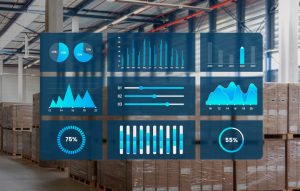Businesses generate an enormous amount of data every day. Data is valuable to businesses. It comes from customer transactions, social media activity and other data sources. With this data, businesses can make better decisions and gain a competitive advantage.
Businesses that use data analytics are 2.2 times more likely to report significant cost reductions. – A study by Dresner Advisory Services
To reap these benefits and leverage the full potential of data, it is crucial to implement data analytics. Data analytics is the process of examining raw data to extract insights and make data-driven decisions. It involves using statistical techniques to analyze data sets and uncover patterns, trends and correlations.
In this blog, we will go through the different types of data analytics, impact of data analytics on business and real-life use cases.
What types of data analytics can you leverage for your unique business use case?
Descriptive analytics
Descriptive Analytics uses data aggregation and data mining to provide insight into the past and answers:
- What has happened?
Descriptive analytics are reports that provide historical insights into company production, financials, operations and sales.
Diagnostic analytics
Diagnostic analytics is a type of data analysis that helps businesses identify the root causes of problems and opportunities. It is used to answer questions such as:
- Why did this happen?
- What can we do to fix it?
Diagnostic analytics is typically used after descriptive analytics, which is used to identify trends and patterns in data. Descriptive analytics can tell you what happened, but diagnostic analytics can tell you why it happened.
Predictive analytics
Predictive analytics uses statistical models and forecasting techniques to predict the future and answer the following questions:
- What could happen?
Businesses typically use analytics to understand how sales will close at the end of the year. They can also predict which items customers will likely buy together. Additionally, analytics forecast inventory levels based on various factors. Sentiment analysis and credit scores are excellent examples of predictive analytics.
Prescriptive analytics
Prescriptive analytics uses optimization and simulation algorithms to advise on possible outcomes and answers:
- Why did it happen?
- Will it happen again?
- What should we do?
Prescriptive analytics can help optimize production and inventory scheduling. This ensures companies deliver the correct products when needed. This can also optimize the customer experience. It helps in better demand planning and adapting to the ever-changing market trends.
Cognitive analytics
Cognitive analytics can interpret complex data sets, identify patterns. It is often described as a way of “thinking like a human” when analyzing data. It answers questions like:
- What are the risks involved in this investment?
- What are the best ways to use our data to make better decisions?
Importance of data analytics in business is growing. Organizations use data analytics to gain insights, make informed decisions and drive better business outcomes. To do so effectively, they must understand the different types of analytics and their applications.
Furthermore, they must choose the appropriate techniques and data analytics tools. It is important to remember that these different types of analytics are not isolated from each other. They can be combined to gain a more thorough understanding of data.
The importance and benefits of data analytics for business
In today’s data-driven world, business analytics is essential for organizations of all sizes. Here are some reasons to establish why data analytics is important:
Improved decision-making: Data analytics provides you with valuable insights that can help make better decisions. By analyzing data, you can identify trends, patterns and relationships.
Competitive advantage: You can use data to streamline operations, optimize marketing and create products that meet customer demands. In turn, this helps you to gain a competitive advantage.
Cost savings: By using data analytics to optimize operations, you can identify futility and cost savings areas. This can lead to reduced costs and increased profitability.
Improved customer experiences: Data analytics can help you gain insights into customer behavior, preferences and needs. By understanding your customers better, you can personalize their offerings, improve customer satisfaction and build customer loyalty.
Innovation: Data analytics can help you identify new opportunities and areas for growth. By analyzing data, you can identify emerging trends, market gaps and unmet customer needs. This can lead to the development of new products and services that better meet customer needs.
McKinsey Global Institute reports that data-driven organizations have significant advantages. They are 23 times more likely to acquire customers and six times more likely to retain customers. Additionally, they are 19 times more likely to be profitable.
3 ways to accelerate data insights:
Embrace artificial intelligence (AI) and machine learning (ML)
AI and ML technologies are becoming more sophisticated and accessible. This enables businesses to analyze their data quickly and accurately. They can gain insights from this data more efficiently than ever before.
Data analysts can leverage these technologies to automate data analysis, identify patterns and trends and make predictions based on historical data. This can significantly accelerate data insights and enable businesses to make informed decisions.
According to a report by Gartner, AI and ML will be used in 75% of all data analytics solutions by 2023.
Implement real-time analytics
Real-time analytics allows businesses to analyze data as it is generated, providing immediate insights and enabling faster decision-making. This can be very beneficial in certain industries, including finance, healthcare and manufacturing. A slight delay in decision-making can have major implications in these areas.
Invest in data visualization tools
Data visualization tools allow businesses to present their data in an interactive visual format that is easy to understand and interpret. Businesses can use charts, graphs and other visualizations to quickly identify patterns and trends in their data. This helps them gain insights and make savvy business decisions.
7 common use cases showing the advantages of data analytics in business
Marketing optimization:By analyzing customer data, businesses can develop targeted marketing campaigns that better meet customer needs. For example, Netflix uses data analytics to develop personalized recommendations for its users based on their viewing history. 75% of content people watch today is provided by their recommendation system.
Supply chain optimization: By analyzing data from suppliers, logistics providers and customers, businesses can optimize their supply chain operations. For example, Walmart uses statistical analysis to optimize inventory management, leading to significant cost savings.
Fraud detection: By analyzing transaction data, businesses can detect and prevent fraudulent activities. For example, American Express uses data analytics to identify and prevent credit card fraud. The company has reduced fraudulent transactions by 60%.
Customer retention: Businesses can analyze customer behavior and feedback to identify factors that influence customer retention. Improving these factors can help businesses increase customer retention by encouraging customers to return. For example, Amazon uses data analytics to personalize recommendations and offers for its customers, which helps to increase customer loyalty. The company generates 35% of its annual sales through its recommendation engine.
Healthcare analytics: Data analytics can analyze patient data and provide insights for improved patient care and resource allocation. The University of Pittsburgh Medical Center (UPMC) uses data analytics to improve patient outcomes and reduce healthcare costs. By analyzing patient data, UPMC can identify high-risk patients and provide targeted interventions to improve their health outcomes.
Product development: By analyzing customer data and feedback, businesses can develop products that better meet customer needs and preferences. For example, Apple uses data analytics to gather customer feedback on its products, which informs its product development process.
Quality control and defect reduction: By analyzing data from sensors and machines on the production line, companies can identify quality issues and potential defects. This allows organizations to make improvements in production processes and product quality.
Toyota uses data analytics to identify potential quality issues in its production processes. By analyzing data from sensors on the production line, the company can detect issues early. This allows them to make improvements to its processes to reduce defects and improve product quality. Toyota’s use of data analytics for quality control has led to a 47% reduction in warranty costs.
Find out how you can address your business challenges with data analytics.
How can your business apply data integration services to solve real-world business challenges?
Data analytics is a powerful tool that can help businesses make better decisions, gain a competitive advantage and improve their bottom line. It enables them to analyze customer data, optimize operations and find ways to reduce costs. This is especially important in today’s data-driven world.
With the right tools and techniques, businesses can unlock the full potential of their data and understand the importance of data analytics. There is no better time than now to adopt data analytics and foster business growth by making insights-driven decisions.
Softweb Solutions is a leading provider of data analytics services, helping businesses of all sizes to unlock the value of their data. With our team of experienced data analysts and scientists, we can help you to address your unique business challenges.
Turn your data into insights that drive business success with Softweb Solutions! Contact us today for a free consultation.










